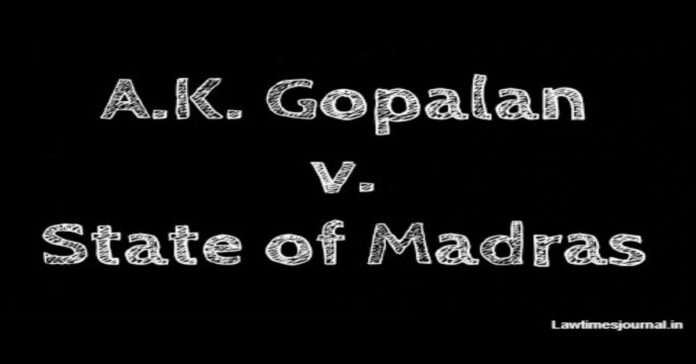
A.K Gopalan v State of Madras
(1950 AIR 27, 1950 SCR 88)
Decided on : 19 May, 1950
SUPREME COURT
BENCH:
KANIA, HIRALAL J. (CJ)
BENCH:
KANIA, HIRALAL J. (CJ)
FAZAL ALI, SAIYID
SASTRI, M. PATANJALI
MAHAJAN, MEHR CHAND
DAS, SUDHI RANJAN
MUKHERJEA, B.K.
COUNCIL OF PETITIONERS: A.K. GOPALAN
Vs.
COUNCIL OF RESPONDENTES: THE STATE OF MADRAS.UNION OF INDIA
Background:
It is one of the most common and known cases of Indian Constitution. This is the first case held by the apex court in which various articles of the Constitution of India contained in the Chapter on Fundamental Rights and were discussed. The main articles were article 19, article 21 & article 22 were dealt with in this case. Almost after 30 years of this case, the Apex Court did away with the restrictive view of the rights embrace therein, by Maneka Gandhi v. Union of India. Nevertheless, for the jurisprudence of Fundamental rights in India, it still makes an important part of the evolution. The most conspicuous feature of this case is its dissenting verdict given by Justice Fazl Ali, one of the two dissenting judges in a six judges bench. The dissenting judgment given by him back in 1950, went on to become an example of personal liberty and liberalized viewpoint for the fundamental rights.
Facts:
Applicant had filed a writ petition under the article 32 of Indian Constitution. The writ petition was Habeas Corpus against the detention. He said that he was in detention since December 1947. He was sentenced to imprisonment but the same was set aside. On 1 March 1950 ,he was served with an order by the state government under section 3(1) of the prevention detention act of 1950. The legality of the order was challenged by him.
Contentions:
- He contended that the state act contravenes that provisions of article 13, 19, 21 of the Constitution of India.
- Also, it was contended that the provision of the said act were not in the consonants with the article 22 of Indian Constitution.
- Also, the same order was said to be served with the malafide intention.
- The question thus went for the supreme court.
- Also this was for the first time that the provisions relating to fundamental rights was challenged before the Supreme Court of India.
- The supreme court also very deeply observe the case in the depth.
Issues:
- Is the preventive detention act 1950, ultravires to the provisions of fundamental rights of constitution.
Judgement:
- The Act was declared to be intra wires to the constitution of India.
- Article 21 is applicable to the provisions of this act
- Section 12 and section 14 were declared to be Ultra vires of the Constitution of India.
- The act also permits the detention beyond the period of three months.
- Also, if it is not necessary for the Parliament to prescribe the maximum Period of the detention.
Overview of Judgement:
The Fundamental rights through the reasoning of procedural by the due process are now read separately, as interpreted in the A.K. Gopalan’s case, which was denounced and the understands the substantive due process which was brought in for the upcoming cases. In the case of Maneka Gandhi v Union of India, the Apex court held that the procedure for Article 21 has to be just, fair and reasonable and also should be in accordance with the principles of equality and freedom under Article 13 and 19 of the Indian Constitution, thus the provisions of fundamental rights were established to be read together.





